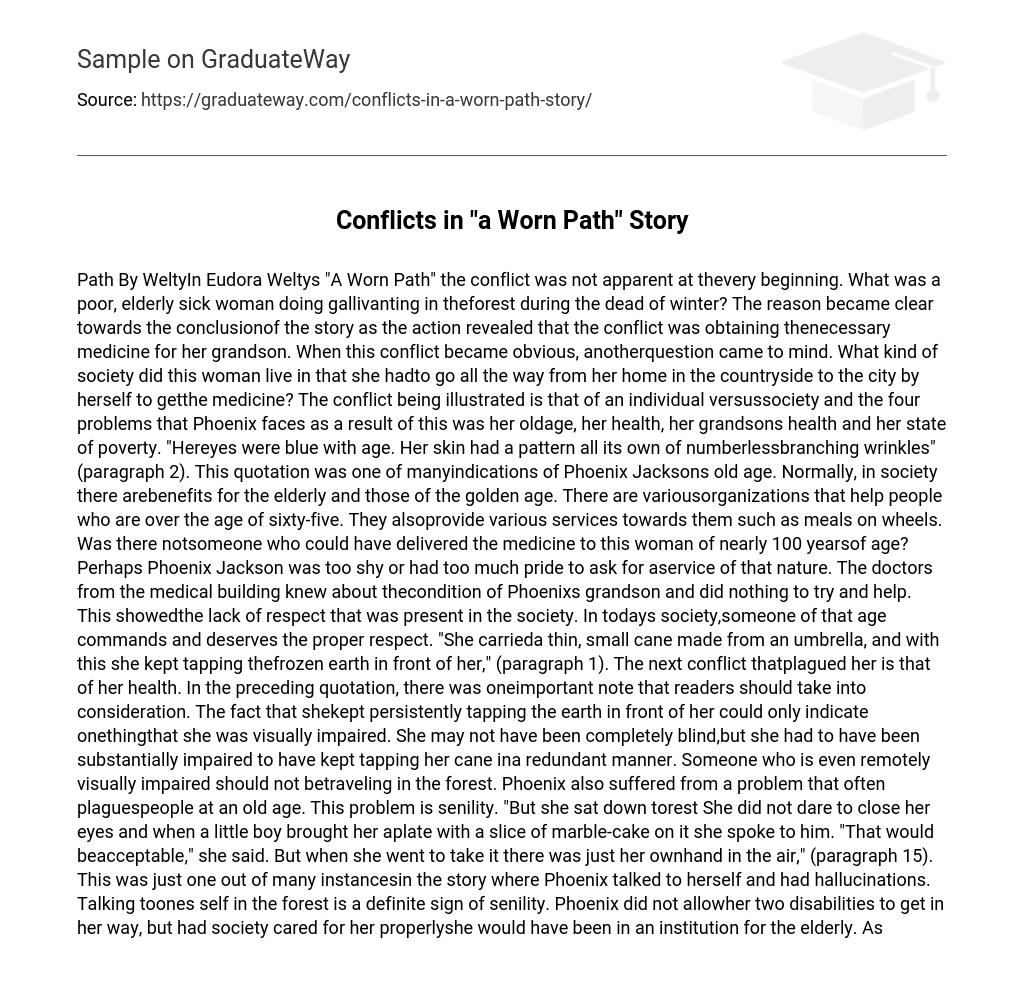Path By WeltyIn Eudora Weltys “A Worn Path” the conflict was not apparent at thevery beginning. What was a poor, elderly sick woman doing gallivanting in theforest during the dead of winter? The reason became clear towards the conclusionof the story as the action revealed that the conflict was obtaining thenecessary medicine for her grandson. When this conflict became obvious, anotherquestion came to mind. What kind of society did this woman live in that she hadto go all the way from her home in the countryside to the city by herself to getthe medicine? The conflict being illustrated is that of an individual versussociety and the four problems that Phoenix faces as a result of this was her oldage, her health, her grandsons health and her state of poverty. “Hereyes were blue with age. Her skin had a pattern all its own of numberlessbranching wrinkles” (paragraph 2). This quotation was one of manyindications of Phoenix Jacksons old age. Normally, in society there arebenefits for the elderly and those of the golden age. There are variousorganizations that help people who are over the age of sixty-five. They alsoprovide various services towards them such as meals on wheels. Was there notsomeone who could have delivered the medicine to this woman of nearly 100 yearsof age? Perhaps Phoenix Jackson was too shy or had too much pride to ask for aservice of that nature. The doctors from the medical building knew about thecondition of Phoenixs grandson and did nothing to try and help. This showedthe lack of respect that was present in the society. In todays society,someone of that age commands and deserves the proper respect. “She carrieda thin, small cane made from an umbrella, and with this she kept tapping thefrozen earth in front of her,” (paragraph 1). The next conflict thatplagued her is that of her health. In the preceding quotation, there was oneimportant note that readers should take into consideration. The fact that shekept persistently tapping the earth in front of her could only indicate onethingthat she was visually impaired. She may not have been completely blind,but she had to have been substantially impaired to have kept tapping her cane ina redundant manner. Someone who is even remotely visually impaired should not betraveling in the forest. Phoenix also suffered from a problem that often plaguespeople at an old age. This problem is senility. “But she sat down torest She did not dare to close her eyes and when a little boy brought her aplate with a slice of marble-cake on it she spoke to him. “That would beacceptable,” she said. But when she went to take it there was just her ownhand in the air,” (paragraph 15). This was just one out of many instancesin the story where Phoenix talked to herself and had hallucinations. Talking toones self in the forest is a definite sign of senility. Phoenix did not allowher two disabilities to get in her way, but had society cared for her properlyshe would have been in an institution for the elderly. As for her grandsonshealth, the readers know that he also, was not doing well. The only pertinentinformation given was that he “swallowed lye,” (paragraph 91). He,also, should have been receiving professional care. An American society in thenineteen fortys did not provide free health care, and that sets up the finalconflict, the state of poverty of Phoenix Jackson. “Its Christmas time,Grandma,” said the attendant. “Could I give you a few pennies out ofmy purse?” “Five pennies is a nickel,” said Phoenixstiffly,” (paragraph 100) This quotation, a conversation between Phoenixand the attendant at the medical building, came after Phoenix had arrived at thedoctors office and had already received her medicine from the attendant.
Phoenix was not ashamed to ask for the extra pocket change so that she could buyher grandson a windmill made out of paper. That nickel was the second nickelthat she had managed to obtain. The first five cents was basically obtainedthrough theft. She distracted a hunter she had met in the forest so that shecould pick up a nickel that he had dropped. Phoenix had no reason to be ashamedof the ten cents that she had acquired through begging and stealing. Herperspective was that society had no respect for her, so why should she haverespect for society? In conclusion, poverty was probably the main conflict outof all the other four mentioned. Had she not been poor, she would have been ableto afford proper care for herself and her grandson and would therefore be livinga higher standard of life. Had she not been poor, she could have paid for a cabride to the city or she could have paid for delivery of the medicine. She wouldnot have had to beg for meaningless nickels. Without money society doesntcare for you and has therefore no respect for you no matter how old you mightbe.
BibliographyWelty, Eudora. “A Worn Path.” Writing About Literature. BriefEighth Edition. Edgar V Roberts Englewood Cliffs, New Jersey: Prentice Hall,1995. 196-201.
English Essays





